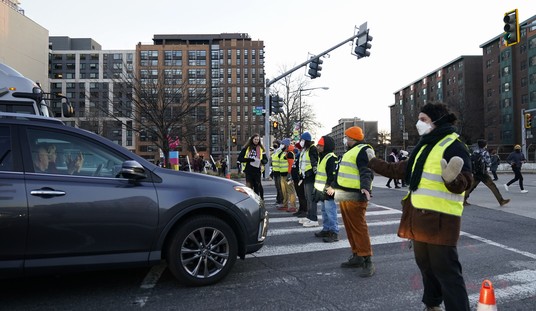What you are about to read about Harvard Law School is real. This is not The Babylon Bee.
Harvard Law gives course credit for studying what a troop of monkeys can teach humans “for creating a society free of male sexual coercion.”
It gets worse from there.
This is part five of PJ Media’s jaunt through the courses taught at the nation’s top ten law schools: Do They Teach Law Anymore?
Hans von Spakovsky and I are marching through the top ten ranked law schools by U.S. News and World Report and sharing with you what is being taught to future lawyers. The militancy and uselessness of the curriculum will astound you.
I already exposed the top-ranked law school—Yale, and then Chicago—and Hans covered number two, Stanford, and also Columbia.
So far, the outlandish course offerings demonstrate that elite law schools have become training academies not so much for effective and competent lawyers, but instead for militant transformational radicals with law degrees. It affects the nation as well as your lives. These graduates from elite law schools have outsized influence in government, on the courts, in academia, and corporate America. They have enjoyed an elevated brand, free from scrutiny from mainstream Americans.
It’s time to reassess that elite law school brand. Perhaps it is time for more conservative judges to stop hiring clerks from these schools.
Strap in. Let’s peruse courses being taught at Harvard Law School.
No elite law school would be complete without the obligatory course in Critical Race Theory. Harvard is the People’s Temple of Critical Race Theory. The “Critters,” as they were called at Harvard decades ago, first advanced the radical idea that law is a value-neutral means of holding power over the oppressed. They thought that all power, even statutes, must be viewed through a lens focused on America’s racist original sins. From the Harvard course catalog:
Emerging during the 1980s, critical race scholars made many controversial claims about law and legal education – among them that race and racial inequality suffused American law and society, that structural racial subordination remained endemic, and that both liberal and critical legal theories marginalized the voices of racial minorities.
Law students at Harvard also study monkey business, namely the important values that human systems can adopt from apes. The Bonobo Sisterhood is the name of an actual one-credit course at Harvard Law where the future legal elite study:
…the power and potential of female alliances to disrupt patriarchal systems. Through a legal, political, social, cultural and economic lens, we ask what lessons the bonobos-our close primate relatives who share 98.7% of our DNA—offer humans for creating a society free of male sexual coercion.
The textbook for the course is The Bonobo Sisterhood: Revolution Through Female Alliances. Ashley Judd’s forward for the textbook begins:
This book you are holding offers a vibrant vision and a detailed plan for uniting yourself with female kind in revolutionary coalitions such as those characterized by the least known of the great apes, the bonobos. . . . I have seized the bonobo call for myself.
Professor Diane Rosenfeld is both the teacher of the class and author of the textbook. Rosenfeld’s other courses include “Feminist Utopias.” That course will give future lawyers hands-on courtroom skills useful to paying clients by examining questions like:
What difference will feminist governance make in society? Is it most effective to reform the current system or to imagine – and then build – an alternative one? Students will have the opportunity to develop their own concepts for utopian ideals in a sex-equal society.
This description illustrates what Hans and I have found over and over in this series: they no longer teach law at these schools in a meaningful way. The Harvards and Yales are producing lawyers who don’t know how to be lawyers.
I recently asked a student at an elite school if they knew the difference between past recollection recorded compared to present recollection refreshed. While this is understandably unknown to most people, lawyers win and lose cases based on these evidentiary rules. Any graduate from law schools like the University of South Carolina, West Virginia University, or Penn State will know the difference. Yet the student from the elite school never even heard of the topic.
That’s the problem with what is happening at elite law schools. They are no longer about graduating lawyers with the basic skills to help clients. Instead, they are deliberately graduating bad lawyers who are good at fundamentally transforming our country toward progressive policies.
So why do they still have a good brand? That’s a question for another day. Back to the Harvard course catalog, it proves the point.
What better way to help fundamentally transform America than by taking “Reforming the American Constitution,” a course taught by – in my opinion – genuine insurrectionist Sanford Levinson. Call him a domestic enemy of the Constitution. His works attack the very essence of the Constitution as well as it’s functional provisions, such as the “undemocratic” presidential veto power. The course description:
I published a book in 2006, Our Undemocratic Constitution, that focused on a number of structural features that could not plausibly be defended under any 21st century theory of democracy. . . . Perhaps more significant than writing lone- or even co-authored books was my serving as chair in 2020-21 of an group brought together under the auspices of the journal Democracy, tasked with drafting a new constitution for the United States.
Indeed, these sorts of folks exist, and they are teaching Harvard Law students.
If things get too heavy for the Harvard Law student, there are courses where they can chill. “Thinking like Yourself: Poetry, Law, and Social Justice.” Berets optional. The course:
…will use poetry as a tool to explode and explore how we think about foundational concepts like equity and governance, substantive areas like criminal justice and emerging technology, and how we understand our own identities as lawyers and advocates.
Again, this is not The Babylon Bee. This is real.
If Harvard Law students grow weary of reading the poetry of a convicted carjacker in the “Thinking Like Yourself” class, they can move on to Virginia Woolf and take “Individuality?: Virginia Woolf vs. Social Justice and Law.”
We’ll read two great novels by Woolf published almost a century ago – Mrs. Dalloway and To The Lighthouse – covering roughly 70 pages per meeting. Both novels feature magnificent portrayals of female protagonists and myriad supporting actors as individuals. In both, power and history envelop them in the form of male domination, war and social class. What should we make of this in our time – and as lawyers – accustomed as we are to thinking in terms of very large groups and forces? Can and should individuality survive as a value and an experience?
Then there is this: a one-credit course called — seriously — “What Should We Believe?” The course is taught by Professor Deborah Hellman. Her Harvard faculty page says:
There are two main strands to Hellman’s work. The first focuses on equal protection law and its philosophical foundation. She is the author of When Is Discrimination Wrong?. . . The second strand of Hellman’s work focuses on the relationship between money and legal rights and includes articles on campaign finance law, bribery and corruption. In this work, Hellman explores and challenges the normative justification of current doctrine. Her article “A Theory of Bribery” won the 2019 Fred Berger Memorial Prize (for philosophy of law) from the American Philosophical Association.
Harvard Law teaches the “Art of Social Change.” The catalog:
This course explores various strategies for systemic law and policy reform, focusing on education, child welfare (abuse and neglect, foster care, adoption), and juvenile delinquency/law enforcement.
This is one of many cases dedicated not to teaching what the law is, but rather what the professors wish the law would be. Call it the utopian pedagogy that infests the elite law schools. It is built on arrogance and selfishness. Their model is not to graduate lawyers who can help clients with real problems, but rather graduate lawyers with the theoretical grounding to upend the law. More examples from Harvard:
“Theoretical Issues in Anti-Discrimination Law,” where instead of focusing on what the law is, what it ought to be gets you the course credit. “This seminar will examine central questions about anti-discrimination law from a philosophical point of view. After considering foundational issues about the nature of discrimination and its legal regulation in general, we will turn to a variety of more specific controversies—potentially including the proper role of disparate impact in establishing discrimination.” I wonder if they will study the Brnovich vs. DNC decision that rejected this sort of nonsense.
Students can take the “Crimmigration [sic] Clinic.” This ungrammatical course name is deliberate, blending the perfectly normal history of enforcing immigration law with the horrors of turning good-hearted migrants into criminals.
In the Crimmigration Clinic students work on cutting-edge issues regarding the intersection of criminal law and immigration law. The content of the clinical projects will depend on the legal landscape and political climate at the time of clinical enrollment.
The “political climate at the time of enrollment” is code for whomever the president is.
A Republican? Then crimmigration is at its peak like some sort of dystopian hell of separated families, prison facilities, screaming children. A Democrat? Then crimmigration is about Delta Airlines tickets from Brownsville to Boston to settle hardworking migrants, or evil Republican governor Greyhound caravans to Mystic, Rhode Island, and Sheldon Whitehouse’s beach club.
I am already at 1600 words. There are so many more courses and not enough space. A final lightning round:
“Compromise” – “Its origin is the contemporary polarization within American politics and the widespread view that compromise with one’s political opponents is something to be avoided if at all possible.” It is training for future Democrat debt ceiling negotiators.
“Communication, Law and Social Justice” – “This course will introduce students to the role that written, oral, and multi-media communications play in the development of American law and policy, with a focus on social issues and movements. Using as case studies advocacy for racial equity, criminal justice reform, immigrant rights, gun rights, environmental protection, and economic opportunity, we will explore how change agents on multiple sides have used strategic framing and messaging, communications campaigns, and art and culture to influence – and in some instances transform – relevant law and policy.”
“Diversity and Dispute Resolution” – “In this course, we will examine the ways in which various types of diversity – such as class, culture, disability, ethnicity, gender, race, religion, and sexual orientation – impact the way we negotiate and resolve conflict, including the effects of intersectionality and privilege.”
If egos at Harvard Law weren’t already inflated, there is “Nietzsche for Lawyers.” The actual course catalog:
Truly speaking, “wrote Emerson ‘it is not instruction, but provocation, that I can receive from another soul.” In this course, we’ll read selections by Nietzsche [plus one book: The Genealogy of Morals] in that spirit. The premise is that provocation by this Master Provocateur may be just the therapy that law students need.
I warned you, this is not The Babylon Bee. Waves of Ubermenschen are graduating from the nation’s elite law schools itching to change the world.









Join the conversation as a VIP Member